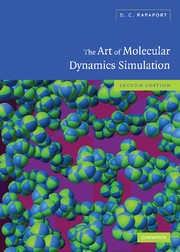Book contents
- Frontmatter
- Contents
- Preface to the first edition
- Preface to the second edition
- About the software
- 1 Introduction
- 2 Basic molecular dynamics
- 3 Simulating simple systems
- 4 Equilibrium properties of simple fluids
- 5 Dynamical properties of simple fluids
- 6 Alternative ensembles
- 7 Nonequilibrium dynamics
- 8 Rigid molecules
- 9 Flexible molecules
- 10 Geometrically constrained molecules
- 11 Internal coordinates
- 12 Many-body interactions
- 13 Long-range interactions
- 14 Step potentials
- 15 Time-dependent phenomena
- 16 Granular dynamics
- 17 Algorithms for supercomputers
- 18 More about software
- 19 The future
- Appendix
- References
- Function index
- Index
- Colophon
15 - Time-dependent phenomena
Published online by Cambridge University Press: 28 February 2011
- Frontmatter
- Contents
- Preface to the first edition
- Preface to the second edition
- About the software
- 1 Introduction
- 2 Basic molecular dynamics
- 3 Simulating simple systems
- 4 Equilibrium properties of simple fluids
- 5 Dynamical properties of simple fluids
- 6 Alternative ensembles
- 7 Nonequilibrium dynamics
- 8 Rigid molecules
- 9 Flexible molecules
- 10 Geometrically constrained molecules
- 11 Internal coordinates
- 12 Many-body interactions
- 13 Long-range interactions
- 14 Step potentials
- 15 Time-dependent phenomena
- 16 Granular dynamics
- 17 Algorithms for supercomputers
- 18 More about software
- 19 The future
- Appendix
- References
- Function index
- Index
- Colophon
Summary
Introduction
Practically all the simulations described so far have involved systems that are either in equilibrium or in some time-independent stationary state; while individual results are subject to fluctuation, it is the well-defined averages over sufficiently long time intervals that are of interest. In this chapter we extend the MD approach to a class of problem in which the behavior is not only time dependent, but the properties themselves are also spatially dependent in ways that are not always predictable. The analysis of the behavior of such systems cannot be carried out following the methods described earlier, which were generally based on the evaluation of system-wide averages or correlations, and one is therefore compelled to resort to graphical methods. Here we focus on MD applications in fluid dynamics, a subject in which atomic matter is conventionally replaced by a continuous medium for practical purposes; recovering the atomic basis is part of trying to understand more complex fluid behavior of the type studied in rheology. For more on the microscopic approach to hydrodynamics see [mar92].
Open systems
Most current MD applications deal with closed systems; this implies either total isolation from the outside world, or coupling to the environment in a way described by one of the ensembles of statistical mechanics. The coupling can occur, for example, with the aid of a thermostat (§6.3), in which case the equilibrium properties are those of the canonical ensemble.
- Type
- Chapter
- Information
- The Art of Molecular Dynamics Simulation , pp. 418 - 435Publisher: Cambridge University PressPrint publication year: 2004
- 1
- Cited by



